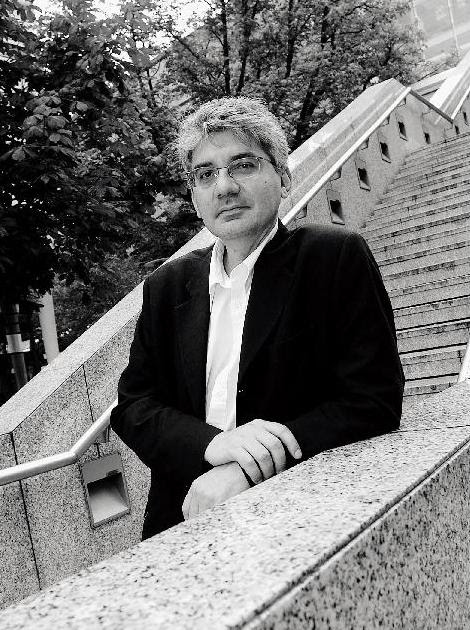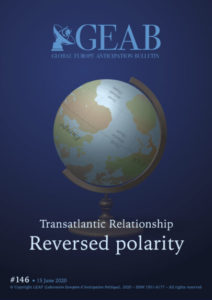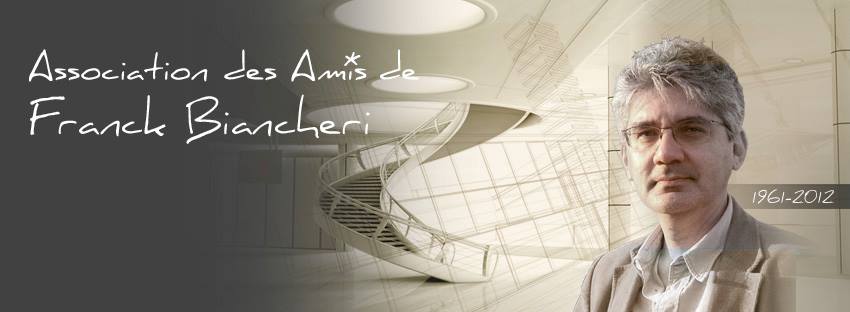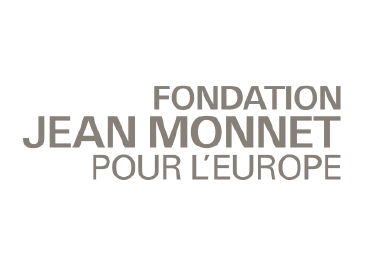Today transatlantic relations are on the verge of collapsing. Not only the fault of Trump, but the whole american dream seems todeviate dramatically from European or even global realities. A process that began more than a decade ago but which the Covid-19 crisis has brutally in the eyes of everyone revealed. However, it is not histrorically thinkable that Europe or rather Europeans turn away from what is happening on the other side of the Atlantic, on the contrary, it is the responsibility of Europe which must assume its role in this historical shift of the centre of gravity of the transatlantic relationship towards Europe (read GEAB 146, 15/06/2020: “The centre of gravity of the transatlantic relationship is shifting towards Europe“). Franck Biancheri has always supported the need for common work between European and American civil societies. TIESWEB (Trans-Atlantic Information Exchange System on the web) founded by Franck Biancheri in 1997, became the tool serving the emerging 21st century transatlantic civil society, helping to master the new information technologies of the internet, understand new strategies and methods of transcontinental cooperation, exchange experiences based on actual People-to-People cooperation. We propose today, in relation with last GEAB publication cited above, to re-discover this interview by the TIESWEB team of Javier Solana, at the time High Representative for Common Foreign and Security Policy about transatlantic values and relations.
Interview with Javier Solana (Tiesweb 2005)
⇒ President Bush’s recent visit to the EU inspired much fuss in the media about a “restoration of transatlantic values”. At the same time, there are many observers – not just in the US but increasingly in Europe, who claim that our values are so different, that the two continents come from “different planets”. Do you feel there are differences of values – looking at anything from contraception in the global fight against AIDS, through the role of multilateral organisations, and up to the use of preventive force – or are the differences a question of perception?
It is interesting that you allude to “Mars and Venus”. Indeed, I used Robert Kagan’s metaphor when I gave a speech at Harvard in 2003 with the title “MARS AND VENUS RECONCILED: A NEW ERA FOR TRANSATLANTIC RELATIONS” (To read the speech). Today, few people suggest that the EU and the US are from different planets. On most issues today, even Iraq, we agree on the goal.
The values debate is often centered on religion, and it is true that Europe is developing into a more secular society whereas the US is more deeply religious. But when you look at other regions of the world, you realize that what seems a growing “values gap” between the EU and the US is, in fact, rather small – and that we, the West, are very similar. Together we are only 15 % of the world population, still we shape the world with our market economies, free societies, human rights, rule of law, democracy. We must not exaggerate our differences, but rather focus on what we have in common and what we both want to achieve.
The important thing is that we pursue the same or largely similar goals. Methods differ at times but that is not a problem. We should talk less about each other and more to each other, especially on what we can do together to tackle the many pressing problems we are faced with.
Yes, we disagreed on the use of force in Iraq (there was disagreement within the EU as well as you might remember) and for the EU, multilateral organizations have a value as such. We agree with the US that such institutions must be effective and promote “effective multilateralism”. We work closely with the US in many international fora and institutions. But partners have to be able to disagree without questioning the basis of the entire partnership.
⇒ Do you think that the EU is establishing itself as a force for shaping international relations, given that it is increasingly setting the international agenda on issues such as Kyoto and the International Criminal Court without the support of the US? What does this trend imply for the EU/USA relationship?
The EU is indeed becoming a stronger force in international affairs. Member states realize that their influence is greatest when they are united and act together. The EU is more experienced in foreign affairs now and has taken on crisis management responsibilities such as the take-over from NATO of the Bosnia mission with 7,000 troops. The EU initiative on Iran is important and supported by the US. EU mediation also played an important role in Ukraine.
The Constitution will strengthen our institutional set-up for foreign policy. Take the creation of the post of an EU foreign minister who will chair the Foreign Affairs Council and also be vice-president of the Commission. He will be supported by a new European External Action Service and EU embassies around the world.
This is a very positive trend for the EU-US relationship: The US needs a strong, united, coherent and pro-active partner. This is what President Bush confirmed during his visit to the EU in February. The European Security Strategy states that the relationship with the US is irreplaceable. We know that to address today’s challenges, the chances for success are greatest when EU and US work together. This is our goal. We always try to define the mission jointly with the US and encourage them to do the same. On most issues facing us today, like the Middle East Peace Process, Europe’s New Neigborhood, counter-terrorism or non-proliferation we work together very closely. And this was even the case at the height of the transatlantic crisis during the Iraq war.
If defining the mission together is not possible, and there are disagreements about the goal we cannot bridge – which are very few, but you named some – the EU can, of course go ahead. The US can and does the same from time to time. But, for instance, on climate change, a problem that worries both EU and US, we decided to cooperate outside the Kyoto Protocol framework and focus on technology. As for the International Criminal Court (ICC), the UN Security Council just referred the situation in Darfour to the ICC. The EU and US agree on the importance of bringing perpetrators to justice. The way to achieve this is sometimes different.
⇒ President Bush affirmed the extremely noble objective of spreading freedom across the world. What contribution is the European Union planning to make to this cause?
Both the EU and the US want to increase the number of democracies around the world. We might have different approaches and use different language (the Europeans talk less about advancing freedom), but human rights, good governance and the rule of law go hand in hand with democracy and freedom. Democracy is in the EU’s collective DNA. It is the bedrock of our system. The wish to belong to this democratic community has been a powerful factor for both change and stability in Europe. Membership of the EU played an important part in the consolidation of democracy first in southern and then in central Europe. Democracy, market economy and protection of human rights and national minorities are the so-called Copenhagen criteria states have to fulfil if they want to join the EU. EU enlargement is an amazing success story, creating a widening area of freedom, democracy and stability. Bulgaria and Romania are next in line, to be followed eventually by Turkey and the Balkans. This form of promoting and safeguarding democracy, EU-style, is voluntary, cost-effective and extraordinarily successful. The magnetic power of the EU played a decisive role in the democratic breakthroughs of Georgia in 2003 and Ukraine in 2004: Local activists appealed to European norms and standards and received strong support from the EU and its member states.
The EU has made a long-term commitment to the wider Euro-Mediterranean area and the Middle East. In the Barcelona process started in 1995 – the EU spends Euro 1 bn in aid and 2 bn in soft loans a year – we have been working with our Arab partners to try to build open societies and open markets, to promote security and prosperity. The new European Neigborhood Policy is an additional tool to reward countries that move forward faster.
Furthermore, EU aid and preferential treatment to most partners are conditional upon fulfilment of political and economic conditions. Spreading freedom based on human rights, the rule of law, democracy and an open economy is encouraged in many of the EU’s bilateral relationships.
EU and US efforts complement each other. As is often the case, the EU’s actions are less on the radar screen. We believe that change has to come from the communities and peoples themselves, and cannot be imposed from the outside. But we stand ready to provide incentives to indigenous reformists. Furthermore, a Europe that has overcome the ideological divide of the Cold War in just 15 years speaks for itself.
⇒ What would you say to some Americans – and indeed Europeans – who claim that the European constitution will undermine NATO – or should NATO now be seen as only one part of the broader political relationship?
To be clear up front: the Constitution contains nothing that would jeopardize NATO or change the EU-NATO relationship. This is one of the myths floating around.
But changes are taking place in the overall Transatlantic relationship. While bilateral relations and NATO remain important, EU-US relations increasingly take center stage. This has to do with the issues at hand: Twenty years ago, of the ten things that the US wanted from Europe, about 7 could be done by NATO, maybe one economic issue by the EC and the rest could be dealt with bilaterally. The world has changed and the new nature of the international agenda reflects that. Most security problems today are complex and diffuse. You need a range of tools to respond to them. Today, maybe only 2 or 3 out of the ten things the US wants can be done by NATO, and 5 or 6 by the EU, 2 or 3 by individual member states. For instance, issues like terrorist financing, cooperation in justice and home affairs or linking of non-proliferation with trade issues (Iran) cannot be done by NATO. The importance of EU-US relations is a function of the new international security environment and the development of the EU in many areas.
The Constitution will make the EU more effective in what it is doing, and will give it some new competences. But it will not undermine NATO because most of the new areas are about issues NATO does not deal with. The European Security and Defense Policy that is already being pursued is complementary to NATO: The EU took over Bosnia from NATO in order to free up NATO for new tasks, in full agreement with NATO and hence the US. The EU took on a mission in Congo upon the request of the UN when NATO did not want to act. In most cases, the problem is not too many countries or organizations wanting to send troops, but too few. What the EU is doing in terms of creating Battle Groups (rapid reaction forces) and rationalizing defence procurement is to make European armed forces more effective, to get better value for the Euros we spend – a request the US has made so often – and responding to requests like from the UN. NATO-EU relations are and will remain crucial.
⇒ In Washington it is widely said that President Bush finds the summits with the EU dull. Following Chancellor Schröder’s proposal to renew the Transatlantic relationship architecture, why, given it is a unique sui generis organisation, does the EU not break out of the formalistic diplomatic style of the nation state, and establish new forms of dialogue, for instance jointly building scenarios with the US of possible futures? Moreover, at a time when public opinion[s] increasingly influences the course of EU/USA relations, is it not time for the EU to take new initiatives targeting civil society operators such as NGOs and universities, rather than the ‘usual Transatlantic suspects’ of diplomats, businessmen, foundations and NATO officers, which have not been able to prevent the current drifting apart of the two blocks?
The more strategic issues are dealt with between the EU and the US, the more room there is for real brainstorming and the more interesting the summits will be. Once again, improvements on the EU side (for instance through the Constitution by changing the external representation of the EU) will be a help . But we are already making good progress. I do not think at all that the visit of President Bush to the EU in February was “boring”. We had an excellent discussion on key strategic issues and we narrowed our differences in a number of areas, for instance on Iraq and Iran.
The EU needs contacts with both governments and civil societies. We increasingly rely on informal dialogue with many US interlocutors outside the summit process. We also do exercises with strategic partners, such as the US, on possible future crises. But resources are limited and it is proper that we focus in the first instance on the problems we face today and tomorrow, and find out how we can together most effectively to address those urgent challenges. And to do that that you mostly need meetings with government officials.
Nonetheless, it is worth pointing out that the EU engages a wide range of US actors: Not only the Administration, but also Congress, the media, universities and think tanks. The Commission sponsors 15 “EU Centers” at different American universities. Student groups are received by the Council for briefings. Me and my staff regularly address think tanks and universities in the US. We recently launched a website on transatlantic relations (direct link on http://www.consilium.eu.int). Hence, there is are a wide range of outreach activities undertaken by the EU. We are trying to expand these and would welcome any proposals and suggestions others have.
Tiesweb (02-05-2005)
“The centre of gravity of the transatlantic relationship is shifting towards Europe“
GEAB 146, 15/06/2020




